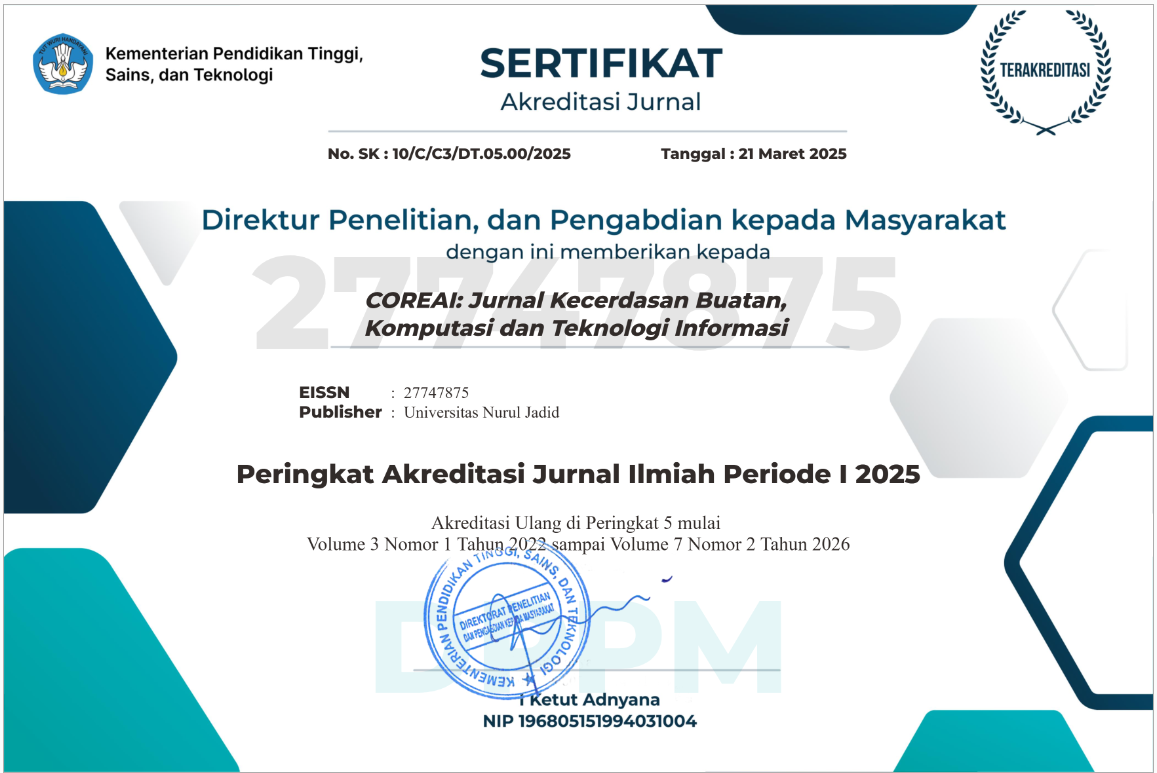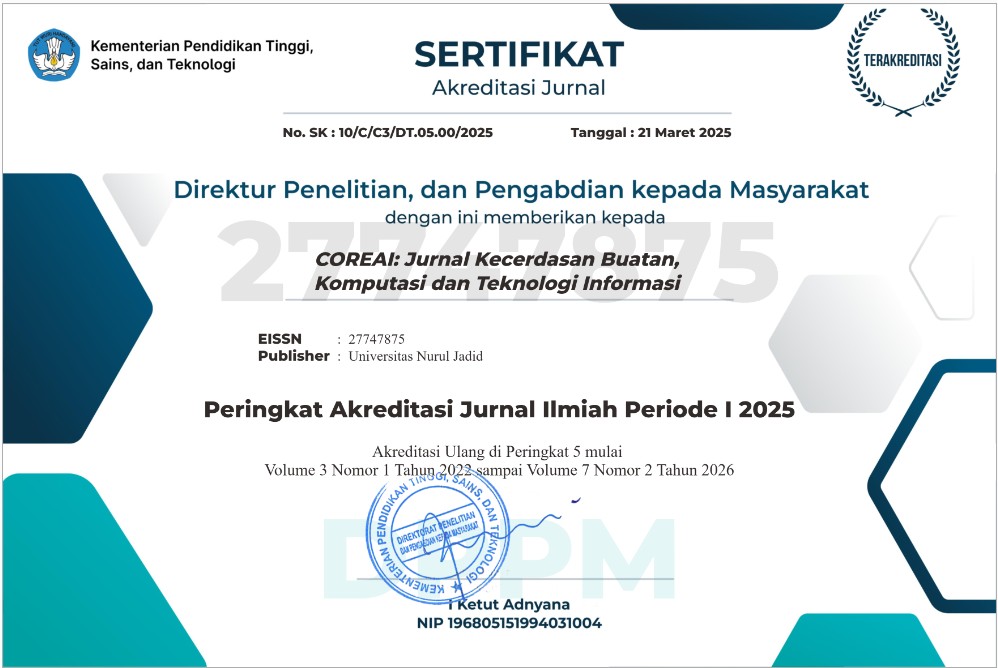Online Submissions
Already have a Username/Password for COREAI: Jurnal Kecerdasan Buatan, Komputasi dan Teknologi Informasi?
Go to Login
Need a Username/Password?
Go to Registration
Registration and login are required to submit items online and to check the status of current submissions.
Author Guidelines
Author Guideliness
General Author Guidelines
- The Manuscript should be written in Indonesian or English and should be original, unpublished and not under reviewed for possible publication in any other journals.
- The Manuscript may take the form of research, case studies, or literary studies.
- The manuscript submitted via website: https://ejournal.unuja.ac.id/index.php/core
- The Manuscript should be prepared according to the following author guidelines and Template. The writing template can be downloaded here
- Submitted manuscripts should have relevance and contribute something to management of Islamic education. The manuscripts should include: 150 words of Abstracts (each in English and Indonesia), Introduction, Methods, Results (findings), Discussion, Conclusion.
Structure of The Manuscripts
The Manuscript that will be submitted in this journal should contain:
- Information of article: Title: no more than 16 words; Author(s) name is fully writen without any title, Institution, email address
- Abstract: The abstract should be clear, concise, and descriptive. The abstract should be presented separately from the article, so it is independent. No more than 250 words, written in both English and Indonesia in one paragraph containing: The research objectives, research methodology, data analysis, and research findings. It is typed using font Book Antiqua (11 pt), single space.
- Introduction: This section comprises the background, the literature review or the summary of previous relevant studies, the aims of writing the article, and the description of the problem solving and clear objectives of the research, with IEEE style with 1.2 spacing. Please try to answer at least two questions: (1) why you believe that your research question is such an important to answer; and (2) how other scholars have or have not answered, or how you think your answer will
other scholars have or have not answered, or how you think your answer will - Discussion : In this section you may discuss every aspect of the issue one by one. It is necessary to build argument and to provide original data discussed and compared to research and works of other scholars. The way to discuss an issue here is by combining the data and the discussion. The discussion is highlighted in the title and subtitles of this section. In addition, this section should significantly explore the research findings without redundant and long direct quotation
- Findings and Discussion : The findings is presented in full and related with the scope of the research determined before. The findings can be completed with tables, graphs, and/or charts. The tables and pictures are given number and title. The result of data analysis is explained correctly in the article. The discussion part logically explains the findings, associated with the relevant sources (Font Book Antiqua 12 pt Bold).
- Conclusion : The conclusion contains the short summary of the findings and discussion. Conclusion is the findings in the research that has the answers for the research questions or the objective of the research.
- References : Containing referenced sources with minimum 80% of books last 10 years issue. The references is written based on IEEE. References and notes should be written alphabetically as follows::
- Bibi, F., Chaudhry, A. G., Awan, E. A., & Tariq, B. (2013). Contribution of Parenting Style in Life Domain of Children. IOSR Journal Of Humanities And Social Science (IOSR-JHSS), 12(2), 91–95. (Journal)
- Fauzi, A. (2017). Building Transformative Management Epistemology at Pondok Pesantren Based on Local Wisdom. In Proceedings of the 1 st International Conference on Education and Islamic Culture “Rethinking Islamic Education Toward Cultural Transformation” Faculty of Tarbiyah, Islamic Institute of Nurul Jadid Probolinggo (pp. 199–203). Probolinggo. (Proceeding)
- Munn, P. (1993). Parents and School; Customers, Managers or Partners. London and New York: Routledge. (Book)
- Jessup, H. (1985). Dutch Architectural Visions of the Indonesia Tradition. Muqarnas, No. 3. (Working paper)
- Luqman, A. (1986). Heboh Peninggalan Sunan Kudus. Tempo, 62. (Article from Newspaper)
Submission Preparation Checklist
As part of the submission process, authors are required to check off their submission's compliance with all of the following items, and submissions may be returned to authors that do not adhere to these guidelines.
- The submission has not been previously published, nor is it before another journal for consideration (or an explanation has been provided in Comments to the Editor).
- The submission file is in Open Office, Microsoft Word, RTF, or WordPerfect document file format.
- Where available, URLs for the references have been provided.
- The text is single-spaced; uses a 12-point font; employs italics, rather than underlining (except with URL addresses); and all illustrations, figures, and tables are placed within the text at the appropriate points, rather than at the end.
- The text adheres to the stylistic and bibliographic requirements outlined in the Author Guidelines, which is found in About the Journal.
- If submitting to a peer-reviewed section of the journal, the instructions in Ensuring a Blind Review have been followed.
Copyright Notice
Copyright Notice
Authors who publish in
COREAI: Jurnal Kecerdasan Buatan, Komputasi dan Teknologi Informasi
agree to the following terms:
- Authors retain copyright and grant the journal right of first publication with the work simultaneously licensed under a Creative Commons Attribution 4.0 International License that allows others to share the work with an acknowledgment of the work's authorship and initial publication in this journal.
- Authors are able to enter into separate, additional contractual arrangements for the non-exclusive distribution of the journal's published version of the work (e.g., post it to an institutional repository or publish it in a book), with an acknowledgment of its initial publication in this journal.
- Authors are permitted and encouraged to post their work online (e.g., in institutional repositories or on their website) prior to and during the submission process, as it can lead to productive exchanges, as well as earlier and greater citation of published work. (See The Effect of Open Access)
Privacy Statement
The names and email addresses entered in this journal site will be used exclusively for the stated purposes of this journal and will not be made available for any other purpose or to any other party.








